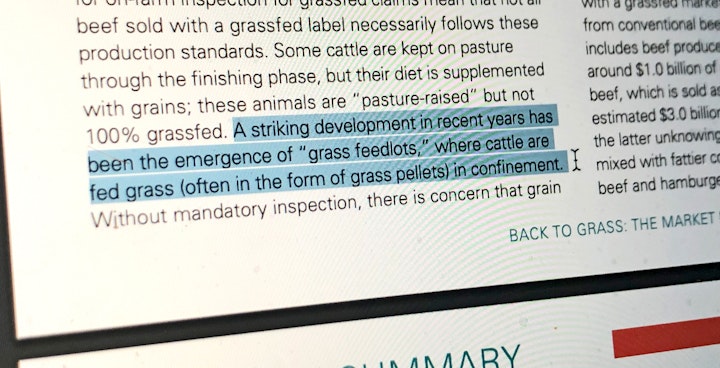SHOP: Truly pasture-raised chicken
Guilt-free chicken that's as delicious as it is healthy.
It may shock some people, but I no longer pay attention to labels on meat products. For years, I’ve traveled the country meeting with chefs and farmers in search of the world’s best craft meat, and over and over I hear that labels and certifications aren't meaningful or helpful, and can be abused to misrepresent the truth.
The “organic” label is a good example. Thanks to the rising popularity of “grass-fed, grass-finished” and “organic” beef, industrial feedlots (in the dry climates they’re usually located), are being repurposed to feed trucked-in cattle organic certified manufactured grass pellets so they can be marketed to consumers. That isn’t the organic I want to buy.
Instead, I know I'm getting quality, taste, nutrition and high ethical practices, because I know the farmers who raise the meat I eat. I know how they raised the animals and how they treat their land. And I know I’m not being swayed by a label but by the farmer's real practices.
SHOP: Truly pasture-raised chicken
Guilt-free chicken that's as delicious as it is healthy.
Of course I’m not saying that labels are always bad, or useless. We all know that in a grocery store context, such labels can boost sales. And for producers for whom the label requirements make sense, this is a good thing.
The trouble is, I’ve met too many counter-examples. Farms whose practices would rightly qualify as “beyond organic,” (if there was such a thing) but who don’t elect to certify organic because it would lead to negative environmental consequences.
A while back, I took my family to stay on a friend’s ranch in northern Montana for a long weekend.
Run by two brothers, and their mother and ancestors before them, it is located on over 1,000 pristine acres of natural prairie land stretching out beyond the horizon, with no signs of humanity other than their family farmhouse. It’s home to a herd of around 200 purebred Hereford cattle.
Stunning orange cows juxtapose the green grasses and blue Montana sky. It’s a natural wonderland of happy cows grazing where buffalo once roamed, on native grasses that have never seen fertilizers or pesticides in recorded history. The family earned the land through the homestead act over 120 years ago.

Lawlor Ranch, Montana: over 1000 homestead deeded acres that have never seen pesticides, fertilizers or chemicals of any kind, and a handful of purebred grass-fed, grass-finished Hereford cattle
I wanted to be helpful, so my 7-year-old Aaron and I volunteered to lend a hand. The farm brothers drove us out to the edge of the property where miles of barbwire fence separate their ranch from the enormous wild lands of the next, and where a stretch of fence was beginning to sag and fall over.
After a few hours of replacing toppled fence posts and stretching barbed wire taut again to stand the fence back up, Mark (one of the farm brothers) says out of the blue, “well, I guess this is why we’re not organic.”
"You’ve got to be kidding me," I thought. It was a shock.
“Why?” I asked sarcastically, “because if the cows lick the fenceposts, the meat will be tainted?”
We all laughed. But it actually wasn’t very funny.
“No, it’s because these are treated wood fence posts. They aren’t allowed.”
He continued, “It snowed 12 feet here last year. So if we used untreated posts, we’d be chopping down a forest of trees every year just to replace the ones that rot away.”

Treated wood fence posts falling down (on a pasture of pristine alpine bentgrass, bluegrass, clump, fescue and other native grasses)
If there ever was “organic” land, this was it. But to qualify for the organic label (and therefore to earn the business or broker buyers), it would mean practices that have purely negative consequences for the environment.
Count me out. If this particular ranch was organic, then I would not want to purchase the beef. The organic label would be misleading for this ranch. A travesty.

With the rising popularity of grass-fed, grass-finished beef comes the emergence of "grass feedlots" (Stone Barns Center)
We didn’t start Crowd Cow to sell meat. We started Crowd Cow to create an alternative to the commodity system and the kinds of “shenanigans” that are associated with them. We are bringing much-needed transparency to an important part of the food system, and helping to create meaningful connection so people can know and appreciate where their food comes from.
As a society, I feel we must go beyond labels. We should recognize and celebrate the actual farmers — the very best ones — who are working in ways adapted to treating animals, their local environments and their communities in a better way — in pursuit of healthier, tastier, better meat.
This is why we put the farm’s name on everything we sell, and it’s why we created Crowd Cow.

My son Aaron waving at the drone, and purebred grass-fed, grass-finished Hereford cattle at Lawlor Ranch in the Bear Paw Mountains of North Central Montana
SHOP: Truly pasture-raised chicken
Guilt-free chicken that's as delicious as it is healthy.
